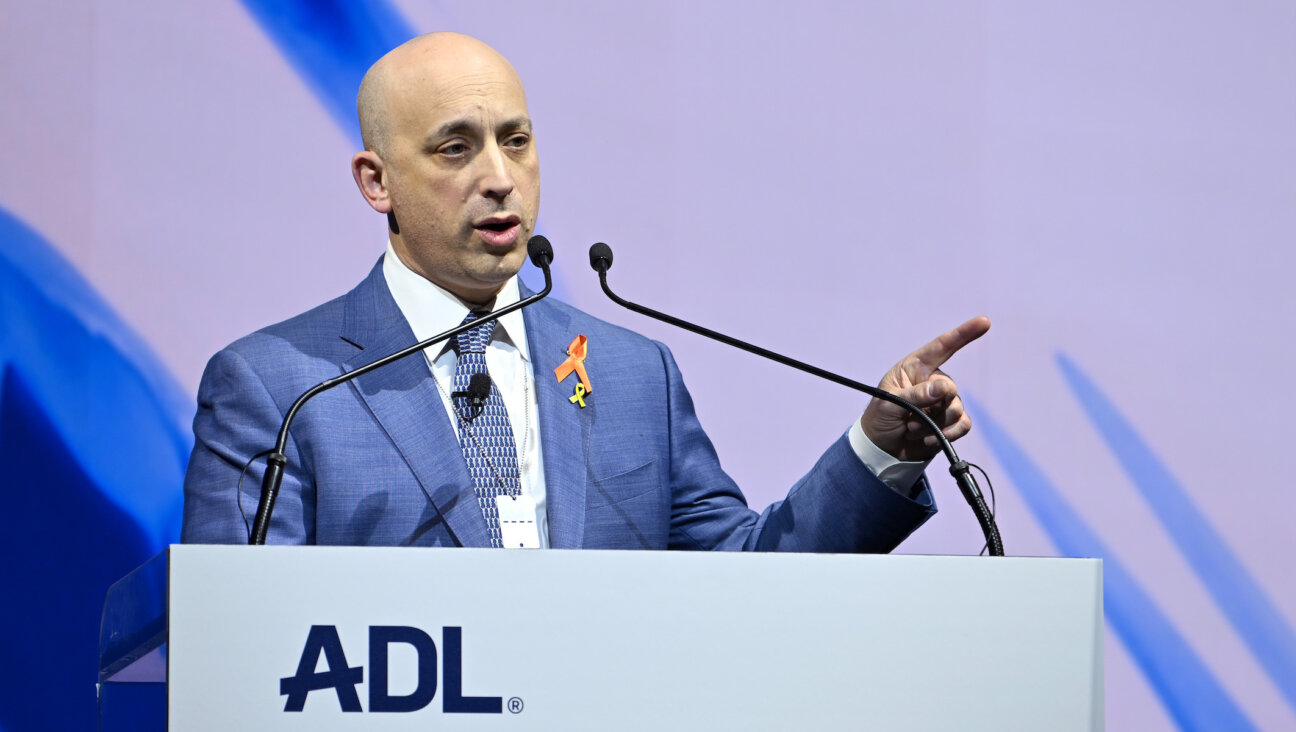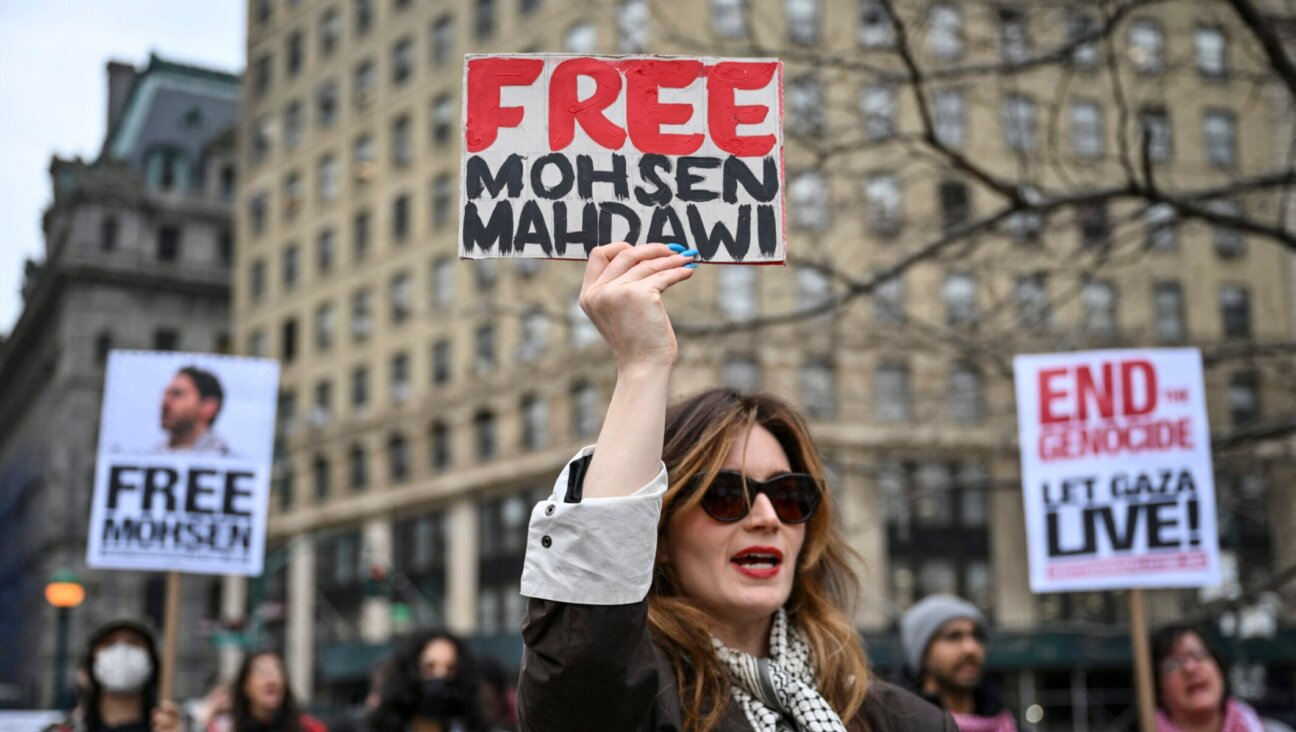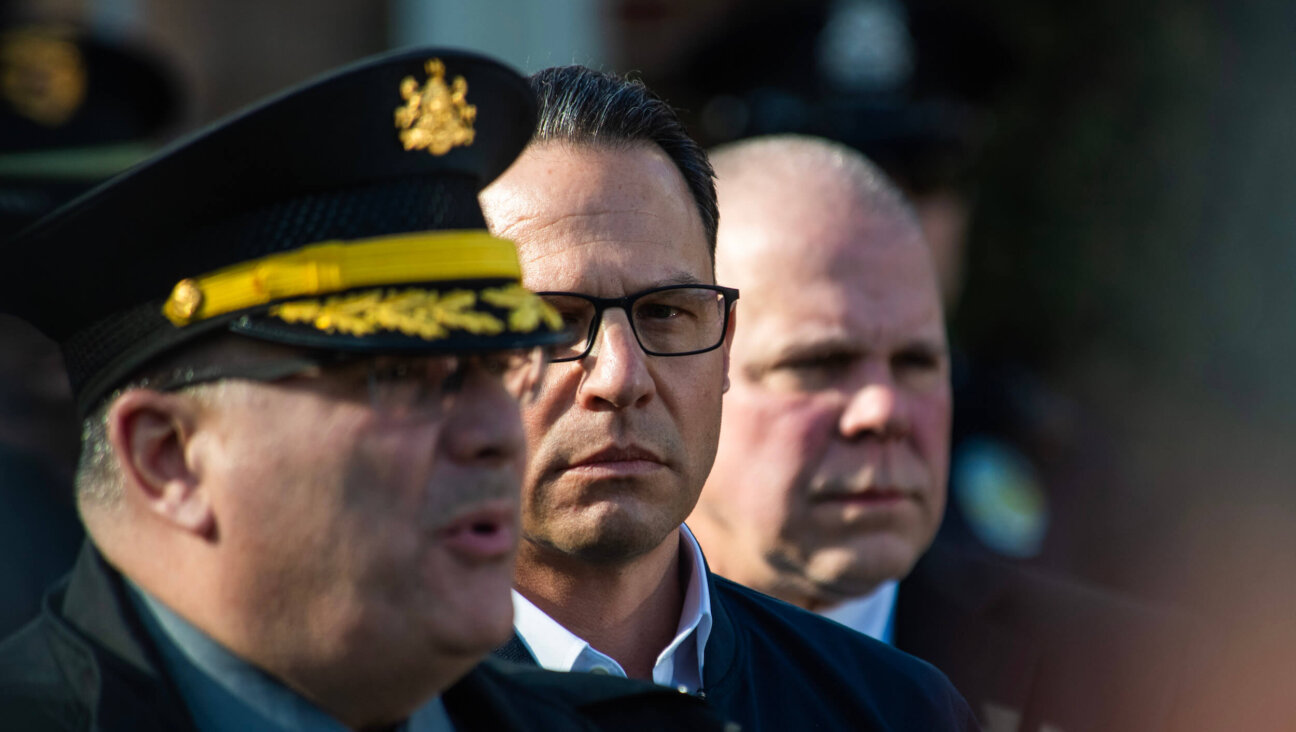For Once, It’s the Thoughts That Count
Citizens of Jerusalem were hopping mad in the days leading up to Shimon Peres’s lavish Israeli Presidential Conference, a gala international talkfest held this past week to celebrate Israel’s 60th anniversary. With 3,500 guests coming from 50 countries, including foreign leaders, titans of business and Nobel laureates, streets had been blocked off and security checkpoints thrown up all over downtown.
Traffic, impossible on a good day, became hopeless. Whole blocks of parking spaces disappeared. Thousands of police and soldiers patrolled nervously, watching for trouble and telling Israelis — Israelis! — to wait in line or keep moving. Tempers boiled over at every traffic light and street corner, and the main target of the rage was Peres, Israel’s world-renowned president.
The three-day conference was intended as a sort of Jewish Davos, a gathering of the greatest minds of the generation to exchange lofty views and honor the Jewish state — and, not incidentally, its president. Among the guests were a brace of foreign heads of state, headlined by President Bush, and such distinguished former rulers as Tony Blair, Mikhail Gorbachev and Abdurrahman Wahid of Indonesia.
Also attending were hundreds of rabbis, chief rabbis and Jewish community leaders from dozens of countries, plus assorted professors, scientists and celebrity billionaires. As the conference opening neared, Israelis’ annoyance with Peres, never far from the surface, approached record levels.
By the day of the opening, May 13, it seemed evident that the event would fall short even of Israelis’ low expectations. The visiting crowned heads turned out to be not world shakers but leaders of 10 small countries in Africa and Eastern Europe, including Albania, Croatia and Burkina Faso, plus Mongolia. Press reports said Israel’s prime minister, Ehud Olmert, also decided to stay away, either because he didn’t want to draw attention to his latest financial scandal or because he didn’t want to be upstaged by Peres. Around the registration table, no one could explain why they came except “to network.”
Opening night at the Jerusalem Convention Center went as expected. Peres and Olmert spoke predictably. Elie Wiesel talked of Jewish love for Jerusalem and railed against the Iranian threat. There were historical film clips and performances by little-known Israeli singers. At the high point, a group of tumblers did flips on stage while six young women in white body stockings hung from the ceiling on white sashes, symbolizing, depending on how charitable one cared to be, either doves of peace or clouds of evaporating national dignity. As the crowd filed out, even diehard Israel apologists were overheard grumbling about the kitsch they had crossed oceans to view.
And then, the next morning, the point of it all became clear. Kicking off a two-day series of panel discussions, a group of distinguished world figures addressed a morning plenary on the “trends that are shaping tomorrow”: Henry Kissinger and Wall Street analyst Abby Joseph Cohen on the “global tomorrow,” French philosopher Bernard-Henri Levy on the “Jewish tomorrow” and Israeli novelist Amos Oz on the “Israeli tomorrow.” All four offered descriptions, some poetic, others merely compelling, of contemporary crises and possible Jewish responses. Oz, by consensus, stole the show with an unexpected presentation of Israel as a society experiencing a little-noticed “golden age of art, literature and science,” yet divided over basic visions — religious, nationalist, socialist-progressive — of the purpose of Israel.
Listening to the four of them on a single stage, Peres’s decision to convene the conference suddenly made sense. Using the power of the Israeli presidency, traditionally a useless commodity, he brought together an unlikely collection of celebrities, power-brokers and has-beens who turned the streets of Jerusalem into a circus sideshow. Lacking money or staff, he contracted the organizing to the Jewish People Policy Planning Institute, a semi-official think tank that was planning a smaller international conference at the same time.
The circus attracted hundreds of television news crews from around the world to follow their hometown leaders. The camera crews, once there, captured a parade of celebrities who managed, at least for a moment, to change the subject in discussing Israel. For those few days, Israel appeared on television screens not as an occupying army but as a thoughtful country producing great art and science and earnestly considering the world’s problems and its own.
The feeling only grew as the day went on with an array of simultaneous panel discussions. One on the future of creativity in a wired and frightened world featured three of America’s best-known young novelists. Another brought seven celebrated medical researchers to discuss the evolving challenges of biological technology at life’s beginning and end. A third focused on the global economy and featured, among others, the French Jewish socialist who heads the International Monetary Fund and a top Chinese government economic planner and former deputy speaker of parliament.
Lunch brought an even more unexpected sight: an unplanned clash between two world leaders over the ethics of globalization. Jose Maria Aznar, the conservative ex-premier of Spain and a Bush ally, used his lunchtime platform to urge that Israel move toward greater privatization, “labor flexibility” and lower taxes. Gorbachev followed, and pointedly disagreed with Aznar.
The man who dismantled Soviet communism delivered a stinging, emotionally charged attack on the “selfish” behavior of “the rich countries.” Even though the end of the Cold War and globalization opened “new opportunities,” Gorbachev said, the opportunities were “squandered.”
“Today, people who live in comfortable conditions are only one-third of the world population,” he said. “Half live in poverty. Nearly 2 billion people live without sanitation or access to clean water.”
“Is that the kind of global world we want?” he asked.
In his most biting remarks, Gorbachev hammered out a rapid-fire list of global rescue plans that have “collapsed” — victims, he hinted broadly, of the Bush administration. In angry staccato he ticked off the Millennium Goals on poverty, the Rio Declaration on sustainable development, the water pact, the Kyoto environment protocols and even the missile treaty that he negotiated with President Reagan.
By contrast, Gorbachev pointed to the success of Israel, “this wonderful, sacred country that is a symbol to all of us,” calling it “the result of Jews uniting their efforts” for a common cause. Today, he said, “we need people uniting their efforts globally in the same way.”
Bush, of course, had no cause to fret. He was the star of the show. Arriving that evening for a packed plenary session, he watched, grinning, as Peres and Olmert fell over each other praising his friendship.
When his turn came, Bush offered perfunctory remarks genially laced with jokes, asking the assembled “heads of state and ex-heads of state” to “save a seat in the ex-leaders’ club.” He asked Americans in the audience to “spend freely and behave yourselves.”
Some well-placed Israelis speculated that Jerusalem was showering Bush with affection — something he rarely gets these days — in the hopes of getting his backing for attacking Iran before his term ends. Others suggested it was simply sincere thanks to a president who backed Israel to the hilt, wisely or not, during a trying era.
Sitting amid the adoring crowd, one could either be cynical or soak in Israel’s gratitude toward a man who seemed to feel their pain when few others did. Either way, you were left with that choked-up feeling when the crowd rose at the end to sing “Hatikvah.”
The Forward is free to read, but it isn’t free to produce

I hope you appreciated this article. Before you go, I’d like to ask you to please support the Forward.
Now more than ever, American Jews need independent news they can trust, with reporting driven by truth, not ideology. We serve you, not any ideological agenda.
At a time when other newsrooms are closing or cutting back, the Forward has removed its paywall and invested additional resources to report on the ground from Israel and around the U.S. on the impact of the war, rising antisemitism and polarized discourse.
This is a great time to support independent Jewish journalism you rely on. Make a Passover gift today!
— Rachel Fishman Feddersen, Publisher and CEO
Most Popular
- 1

News Student protesters being deported are not ‘martyrs and heroes,’ says former antisemitism envoy
- 2

Opinion My Jewish moms group ousted me because I work for J Street. Is this what communal life has come to?
- 3

News Who is Alan Garber, the Jewish Harvard president who stood up to Trump over antisemitism?
- 4

Fast Forward Suspected arsonist intended to beat Gov. Josh Shapiro with a sledgehammer, investigators say
In Case You Missed It
-

Culture ‘Shtisel’ star Sasson Gabay is happy to be back playing a complex haredi Orthodox Jew in ‘Kugel’
-

Fast Forward Noa Argamani, ADL’s Jonathan Greenblatt among over a dozen Jews on 2025 TIME 100 list
-

Fast Forward US claims Mohsen Mahdawi’s activism could ‘potentially undermine’ prospect of peace in Gaza
-

Opinion What Jewish university presidents say: Trump is exploiting campus antisemitism, not fighting it
-
Shop the Forward Store
100% of profits support our journalism
Republish This Story
Please read before republishing
We’re happy to make this story available to republish for free, unless it originated with JTA, Haaretz or another publication (as indicated on the article) and as long as you follow our guidelines.
You must comply with the following:
- Credit the Forward
- Retain our pixel
- Preserve our canonical link in Google search
- Add a noindex tag in Google search
See our full guidelines for more information, and this guide for detail about canonical URLs.
To republish, copy the HTML by clicking on the yellow button to the right; it includes our tracking pixel, all paragraph styles and hyperlinks, the author byline and credit to the Forward. It does not include images; to avoid copyright violations, you must add them manually, following our guidelines. Please email us at [email protected], subject line “republish,” with any questions or to let us know what stories you’re picking up.













